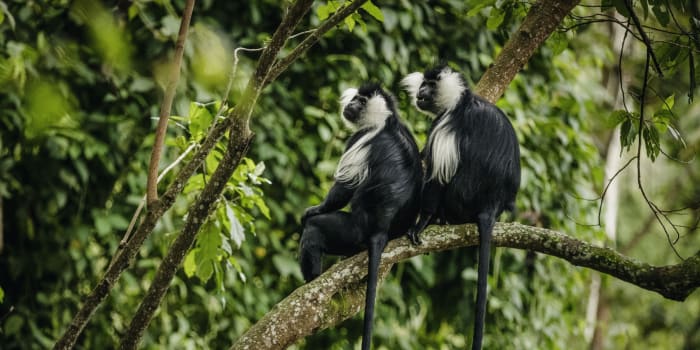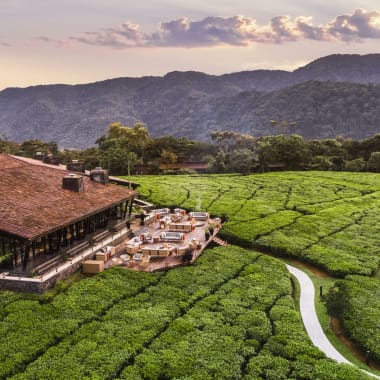
Nyungwe National Park
Between Chimpanzees and Rainforest
Nyungwe National Park is one of Africa’s most breathtaking natural treasures and a must-visit for nature and adventure enthusiasts. Nestled within the Albertine Rift in southwestern Rwanda, it spans over 1,000 square kilometers and is considered one of the oldest and best-preserved montane rainforests in Africa. With its remarkable biodiversity and ecological significance, it attracts travelers from around the world, offering a truly immersive wilderness experience.
Best Travel Time
The best time to visit Nyungwe National Park is between July and September.
Geography and Significance
Nestled within the Albertine Rift, a geological zone renowned for its exceptional biodiversity, Nyungwe National Park is a haven for flora and fauna. The park boasts over 1,000 plant species, more than 300 bird species, and 13 different primate species. Beyond its ecological wealth, Nyungwe plays a crucial role as Rwanda's water lifeline—around 70% of the country’s freshwater originates from this rainforest, which also feeds the sources of major river systems like the Nile and the Congo.
The Enchanting Wildlife of Nyungwe National Park
Nyungwe National Park is a biodiversity treasure trove, hosting one of Africa's richest ecosystems. From elusive primates to vibrant bird species, the park's spectacular array of flora and fauna delights both nature lovers and researchers alike.
Primates and Their Unique Characteristics
With 13 primate species, Nyungwe is a paradise for primate watchers. The park's most famous residents are its chimpanzees, which can be observed during guided trekking tours. Equally captivating are the Ruwenzori colobus monkeys, known for their massive groups of up to 400 individuals—a rare sight anywhere in the world. Other highlights include the endemic L’Hoest’s monkeys, golden monkeys, and Angola colobus monkeys, making Nyungwe a top destination for primate enthusiasts.

Remarkable Bird Species
Nyungwe National Park is also a haven for bird watchers, with over 300 documented species, 27 of which are endemic to the Albertine Rift region. Standout species include the great hornbill, the striking giant blue turaco, and the vibrant Rwenzori turaco. With its abundance of rare and endemic birds, Nyungwe ranks as one of Africa’s top birding destinations, drawing enthusiasts from around the globe year after year.

Planning and Experiences in Nyungwe National Park
Nyungwe National Park offers a wide range of activities and unforgettable experiences for adventurers and nature enthusiasts alike. From thrilling primate encounters to breathtaking canopy walks and scenic hiking trails, this unique rainforest promises diverse ways to explore its wonders.
Chimpanzee Trekking in Nyungwe National Park
Chimpanzee trekking is undoubtedly one of the park's most captivating activities. Guided by experienced rangers, visitors traverse the dense rainforest to observe habituated chimpanzees in their natural habitat. These tours not only offer a once-in-a-lifetime experience but also provide fascinating insights into primate behavior. While the trails can be physically demanding, the chance to witness our closest relatives up close makes every effort worthwhile. The cost of a chimpanzee trekking permit is $150 for international visitors, with group sizes limited to a maximum of eight people to ensure an intimate and exclusive experience.
The Canopy Walk – A Visitor Favorite
Another highlight of Nyungwe National Park is the Canopy Walk, a 200-meter-long suspension bridge that soars up to 70 meters above the forest floor. This unique adventure offers visitors spectacular views of the rainforest canopy, resembling a sea of greenery from above. Thrill-seekers and photographers alike will enjoy the breathtaking perspective, with clear weather even revealing vistas as far as Lake Kivu. The Canopy Walk costs $40 for international visitors—a price well worth the exhilarating views and unforgettable experience.
Best Time to Visit and Climatic Features
The ideal time to visit Nyungwe National Park is during the dry season, from June to October, when conditions are perfect for hiking and wildlife observation. During these months, the trails are less slippery, and the chances of spotting primates, such as chimpanzees, are particularly high. The rainy season, from November to May, brings lush vegetation and is best suited for visitors who want to witness the rainforest in its full glory.
Sustainable Ecotourism in Nyungwe National Park
Nyungwe National Park is a shining example of sustainable ecotourism in Africa. By integrating conservation efforts, community-based initiatives, and responsible tourism management, the park successfully preserves its unique biodiversity while empowering local communities.
Eco-Friendly Accommodations
Travelers can enjoy eco-friendly accommodations that balance sustainability with comfort. The One&Only Nyungwe House is a standout choice, powered entirely by solar energy. The lodge emphasizes farm-to-table cuisine made with local ingredients and offers cultural experiences as part of the stay.
These sustainable accommodations allow visitors to explore the park responsibly, without compromising on luxury or comfort.
Villages and Communities Around the Park
A key element of Nyungwe’s sustainable ecotourism approach is its close collaboration with surrounding communities. Since 2017, 10% of park entry fees have been allocated to regional development projects through a revenue-sharing program. Visitors can engage in community-based tours to experience traditional crafts, such as pottery and blacksmithing, or join tea tours to learn about local tea production.
Additionally, travelers can participate in the Umuganda program, a nationwide initiative promoting volunteer work. All park hikes are led by local guides, offering authentic insights into the daily lives of the surrounding communities.
This seamless integration of tourism and community development makes Nyungwe National Park a destination where visitors can immerse themselves in nature while contributing to sustainable growth and cultural preservation.
Practical Information for Travelers
Nyungwe National Park is not only a stunning natural paradise but also a destination that requires careful planning. With sustainable travel options, safe transportation methods, and proper health precautions, visitors can make the most of their experience.
Getting There and Transportation Options
Travelers have several eco-friendly options to reach Nyungwe National Park and get around. For a sustainable journey, public buses are a great choice. From Kigali, visitors can travel to Butare (Huye) and continue to Gisakura, the closest town to the park's entrance. Carpooling offers another resource-efficient option, blending comfort and sustainability. For quicker access, flights are available from Kigali to Kamembe International Airport, located about 32 kilometers from the park.
Within the park, hiking is the primary mode of exploration, with over 130 kilometers of marked trails inviting visitors to immerse themselves in nature. Guided by trained professionals, these hikes ensure safety while offering deep insights into the park's flora and fauna. The famous Canopy Walk, a 200-meter suspension bridge, provides breathtaking views of the rainforest canopy, all without disturbing the delicate ecosystem.
Safety and Health Precautions
To ensure a safe and healthy visit to Nyungwe National Park, travelers should take several precautions. Guided tours are mandatory, as government-registered guides ensure safety and adherence to official trails. Night walks should be avoided, and visitors are advised to follow the instructions of park rangers and local security personnel.
Before traveling, ensure that all recommended vaccinations — such as yellow fever, hepatitis, and typhoid—are up to date. As Rwanda is a malaria zone, antimalarial medication and insect repellent are essential, along with long clothing and sturdy footwear. The rainforest’s humid climate also calls for weatherproof clothing. Finally, strict hygiene regarding food and water is crucial to minimize health risks.
With proper preparation and adherence to these guidelines, travelers can enjoy a safe and unforgettable visit to Nyungwe National Park.

Are you ready to experience Nyungwe National Park for yourself?
Cultural and Environmental Aspects
Nyungwe National Park impresses not only with its natural beauty but also with its cultural experiences and exemplary conservation efforts.
Cultural Highlights and Local Experiences
Around Nyungwe, visitors can dive deeper into Rwanda’s rich history and traditions. The Nyanza King’s Palace Museum, located on the way to the park, offers fascinating insights into Rwanda’s former monarchy. Traditional architecture and cultural artifacts bring the country’s history to life.
Direct interactions with the local population further enrich the experience. In nearby villages, residents invite travelers to partake in authentic activities, such as learning traditional crafts or enjoying cultural performances. Another highlight is the Gisakura Tea Plantation, where visitors can explore the production process of Rwanda’s famous tea and understand its economic importance.
Climate Change, Environmental Challenges, and Conservation Efforts
Climate change poses significant challenges to Nyungwe National Park, with shifting rainfall patterns leading to extreme weather events like floods and extended dry spells. Rising temperatures also threaten biodiversity by encouraging the spread of invasive species.
In response, targeted measures are being implemented to protect the park. Reforestation projects help restore damaged areas, while initiatives such as introducing efficient cookstoves and promoting sustainable agriculture reduce local dependence on forest resources. Scientific monitoring programs track climate change impacts, enabling the development of long-term adaptation strategies.
International collaborations, such as a partnership with Germany’s Hunsrück-Hochwald National Park, foster knowledge exchange and innovative conservation solutions. These collective efforts ensure the park’s preservation for future generations.
Incorporating Nyungwe Into a Rwanda Itinerary
Nyungwe National Park is a must-see on any Rwanda itinerary and pairs seamlessly with other highlights of the country. A well-planned route allows visitors to experience Rwanda’s diverse landscapes, from vibrant cities to lush rainforests and serene lakes.
Combining Kigali and Lake Kivu
Kigali – The Perfect Starting PointRwanda’s capital, Kigali, serves as the cultural and economic hub of the country and an ideal starting point for a visit to Nyungwe National Park. With an international airport, Kigali offers convenient access and features attractions like the Kigali Genocide Memorial and bustling markets showcasing both modern and traditional Rwandan culture. From Kigali, it’s a five- to six-hour drive to Nyungwe, offering a scenic journey through Rwanda’s stunning landscapes.
Lake Kivu – Relaxation and AdventureOn the way from Nyungwe to the northern national parks, Lake Kivu provides a perfect opportunity for a well-deserved break. Travelers can unwind on idyllic beaches, enjoy boat tours, or try watersports. The hot springs of Nyamyumba are a particular highlight, offering a relaxing retreat. Lake Kivu complements the adventure-filled Nyungwe visit with serene moments in a breathtaking setting.
Travelling Nyungwe National Park
- Safari in Akagera National Park
- Visit to the Kigali Memorial Center
- Chimpanzees in Nyungwe Forest
- Gorilla Trekking
Hotels in Nyungwe National Park
To book a trip or for more information, contact us. We'll help you plan and guide you through your upcoming adventure!









